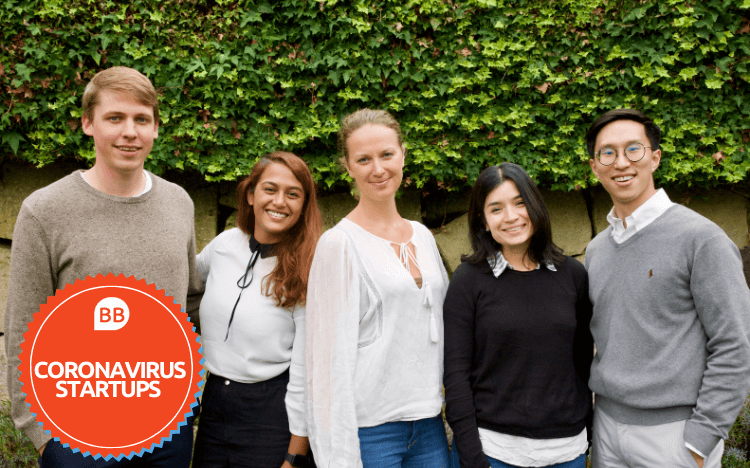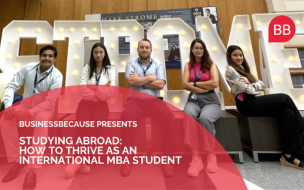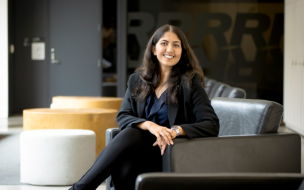IMDMy Health Diary

Who: Herman Huang
School: IMD
Valuation: $10 million
Investment: $1 million
Q&A
What is your business and what does it do?
My Health Diary is a health tech currently serving Indonesia market and in the future targeting other Asian countries as well.
Our vision is to realize Precision Medicine concept and by doing so we can improve the quality and efficacy of the healthcare sector and reducing the cost. The apps based on SaaS model in which we help B2B (hospitals,clinics and etc) and also B2C (individual users) to digitalize their medical services, medical record, connecting their operations into our app system and make better informed curative efforts by monitoring health condition of patients over a meaningful time period.
We put into the apps AI capability for automatic early advise and also to analyze big data. We also integrate wearables as IOT input to the apps for individual tracking of vital signs.
How did the idea for your business come about?
We were very concerned about the condition of healthcare in Indonesia and other Asian countries.
The quality of healthcare services varies widely from cities to villages, public confusion due to various misinformation spreading around, and ever increasing cost of healthcare but this coupled further with lower efficacy on medical treatments given.
We believe everybody deserves to be healthy and get the best treatment possible, especially with the availability of technologies such as AI and Telemedicine.
We decided then in late 2018 to create a new type of healthtech app to give back to society and transforming lives in the long run.
Since March 2020,we created specific COVID-19 Features such as chatbot to diagnose whether users are likely to contract coronavirus, informational webinars about the virus, and supporting regional governments in Indonesia with their track and trace efforts.
How has the MBA helped you develop the business?
The MBA from IMD back in 2012 clearly helped me a lot by giving me the useful tools and knowledge pertaining to management and innovation. It also opened up a lot of doors that otherwise won’t be so easy to open.
One more trait I would like to highlight from IMD’s MBA is the leadership skills which equipped me to know myself and to be tactical, but also humble in my entrepreneurship journey.
Where are you with the business right now? What are your plans for the future?
Our efforts to counter the effects of coronavirus have been widely recognized and we were selected as the winner of Digital Challenges from Asian Development Bank for “Restoring Public Confidence in Travelling,” back in September 2020.
ADB is giving us grant and other assistances to spread the usage of our apps in Indonesia and other Asian countries.
At the moment, my plan is to keep doing innovative business and apps across Asian Region and giving the impact back to the society at the same time.
What are your tips for staying positive during the pandemic?
I keep myself busy and make sure I give positive contribution towards the handling of Pandemic in my society.
I believe various phenomenon in our live is temporary and everything that come shall pass too.
Duke FuquaDoctor's Choice

Who: Yahya Remtulla
School: Duke University Fuqua School of Business
Valuation: TBC
Investment: TBC
Q&A
What is your business and what does it do?
We are on a mission to make hospital-used UVC light accessible for all.
We have created a large, portable UV sanitizer box to disinfect commonly-used and highly touched items, like your phone, keys and wallet, in a safe manner. This will keep us all safer during the pandemic and beyond.
How did the idea for your business come about?
Back in April, when the mandatory quarantine was lifted, very few people were taking precautions around catching COVID-19 from personal items.
It is common knowledge that germs, including COVID-19, can live on surfaces for days and act as the cause of sickness. When researching solutions to this problem, I came across UVC light.
The technology breaks apart the DNA/RNA of any germ and has been used in hospitals for years. I felt that this technology needed to be available to everyone. That’s what I set out to do: prevent people from getting COVID-19 from their personal items.
How has the MBA helped you develop the business?
I could literally spend an hour relaying how my MBA has helped me develop my business. The professors, course material and experiential learning opportunities at Fuqua have been invaluable.
Most notably, my MBA experience has taught me how to identify and quantify business opportunities, and to develop a strategic activity network, to keep the business differentiated.
In addition, I have learned to build a brand by focusing on developing strong, positive associative networks, to understand our customers deeply, to segment our markets and to tailor our messaging to connect with them seamlessly.
Where are you with the business right now? What are your plans for the future?
We successfully launched on Amazon in August, having great success. We have also launched our website, Doctor’s Choice UV Sterilizer, and are taking orders right now! Our future plans are to create tailored solutions for post COVID-19 customer segments, like immunocompromised children, as well as developing new solutions, such as UVC air purification systems.
What are your tips for staying positive during the pandemic?
Apart from watching re-runs of The Office, I would say to keep perspective.
If you are safe, healthy and surrounded by loved ones, know that there are many people who would love to be in your position. Also, the year 2020 will make the history books.
We will talk to our children and grandchildren about living through a pandemic, social activism, and the most polarizing election ever. Live in the moment and create memories. Remember, you can be that cool grandparent with stories your grandkids want to listen to during the holidays!
UCLA AndersonAmptron Medical

Who: Nirav Patel
School: UCLA Anderson School of Management
Valuation: Not disclosed
Investment: Capital raising planned for 2021
Q&A
What is your business, and what does it do?
Amptron Medical is developing a neonatal bridge ventilator—SimpliVent.
The product provides safe and effective respiratory support to treat mild to moderate levels of respiratory illness in neonates.
SimpliVent is a low-cost respiratory care alternate for saving lives. SimpliVent bridge ventilator uses an existing FDA-approved ventilation therapy to deliver oxygen to a subset of patients suffering from respiratory disease.
How did the idea for your business come about?
The COVID-19 pandemic has highlighted gaps in our healthcare system.
In fact, we were conducting business research on the need for low-cost ventilators in resource-limited environments mid-2019, before the pandemic erupted.
When the pandemic hit, major respiratory makers and auto manufacturers scaled up ventilator manufacturing. During the crisis, hospitals were repurposing their neonatal ventilators for COVID patients, leaving vulnerable lives at risk.
We identified a niche market of neonatal respiratory care, and focused our efforts on developing a product solution that fills that market gap. SimpliVent, in the short term, will mitigate the COVID-19 crisis by freeing up ventilators for COVID patients.
In the long term, SimpliVent will serve the respiratory needs of neonatal and pediatric patients. It is a low-cost respiratory care alternate for saving lives in developing countries as well.
How has your MBA helped you develop your business?
UCLA Anderson helped me bridge the gap between my engineering background and entrepreneurship.
My experience in engineering medical products has taught me how to convert an idea into a product, and an MBA education has helped me transform a product into a business. The highlight of my MBA experience was taking our early-stage startup through the Anderson Venture Accelerator’s summer Activate program. We connected what we learned in our coursework and applied it to form a solid foundation for the business.
What are your tips for staying positive during the pandemic?
The COVID-19 pandemic led to the closure of many businesses, but it has also opened up several new commercial opportunities that never existed before.
It is a matter of identifying the opportunities and developing solutions and enterprises to fulfill them. So, the advice I’d give to future entrepreneurs is to keep looking and think outside of the box. Like Steve Jobs said, “Stay hungry, stay foolish!”
Horaizon

Who: William Mitchell and Nate Koweda
School: Cornell, Johnson Graduate School of Management
Valuation: TBC
Investment: Not disclosed
Q&A
What is your business and what does it do?
Horaizon allows remote teams to collaborate with the same set of natural behaviors they do in the office.
Users simply speak to their colleagues about whatever comes to mind, and are connected in real time. And we display lightweight avatars on the screen to represent what’s happening in the office including who’s talking to who, and breaks.
This way, you can make the casual comment or ask a question no problem. You can do all of that in Horaizon, as easily as in a physical office.
How did the idea for your business come about?
In the first several weeks of our MBA program, we were driving to and from school and discussing remote work as an idea—why with all its obvious benefits for workers and businesses it wasn’t more widespread.
We concluded that existing technologies were built for co-located teams that had the occasional out of office employee, rather than coming from a fully remote paradigm.
Because we make available the same natural behaviors by which teams collaborate when co-located in the remote space, we help businesses & workers alike experience the best of both worlds, co-located and remote.
How has the MBA helped you develop the business?
Johnson Cornell Tech’s curriculum taught us to think about the holistic environment that startups operate in, and particularly how to use technology to serve users while avoiding the trap of force fitting users to technology.
Where are you with the business right now? What are your plans for the future?
We’re alpha testing right now. This early user feedback will help us determine where to put our focus as a we develop a scalable beta and look to fundraise.
What are your tips for staying positive during the pandemic?
Early on, we, along with some other classmates, made an effort to keep people involved through a mix of social activities and coffee chats.
The most important thing was to give different people the chance to lead. Taking an active part in doing something for others is a sure way to feel good.
Localing

Who: Deepak Ojha
School: Cambridge University Judge Business School
Valuation: TBC
Investment: TBC
Q&A
What is your business and what does it do?
Localing is a social venture aiming to provide digital capabilities to local businesses. Every local store will have its storefront, where they can sell their products and services and offer local deals.
For customers, it would serve as their local e-marketplace, aggregating product, and service providers in their area.
We provide a platform for businesses to reach local customers through digital sales and marketing channels. Businesses advertise package deals and discounts, exclusively available and easily purchasable at Localing by local members of the community.
These deals can be redeemed in-store at the customer's convenience, not only leading to greater sales volumes through secondary purchases but also increasing customer stickiness through the Localing loyalty point scheme.
How did the idea for your business come about?
We came up with this idea during the Cam v/s Covid hackathon organised by the Cambridge Hack Foundation in May 2020.
A lot of businesses at that time were under financial stress given the lockdown. Digging deep into the problem made us realize that the pandemic has just accelerated the downfall of small and micro-businesses, which were already struggling to compete with global e-commerce giants.
The basic skeleton of our business was created during the three-day hackathon, which we eventually won. After the hackathon, we received encouragement from leaders of local councils around Cambridge, and we decided to take Localing forward.
How has your MBA helped you develop your business?
My MBA greatly helped in realizing the idea of Localing.
Firstly, the core concepts taught in Entrepreneurship, Marketing, and Strategy courses helped us build a strong value proposition in the first place, which helped us win the hackathon competing against some well-established teams. This knowledge is also helping us create an appropriate strategy for launch, customer
attraction, conversion, and retention, or creating the equity structure of the company.
Secondly, the MBA helped us connect with people who helped us through our journey. From professors to mentors who guided us at every step, everyone has a Cambridge Judge Business School connection.
Where are you with the business right now? What are your plans for the future?
We are currently finishing our product development. With no open-source multi-vendor e-commerce platforms available, we had started from scratch, from our landing page, to the AI capabilities.
We aim to finish the product and launch by mid-January 2021 (maybe earlier), just before we start our journey at the Accelerate Cambridge programme.
What are your tips for staying positive during the pandemic?
I can share two tips here:
We live in a fast-paced world where most of us are racing towards something or the other. This pandemic has slowed down the world and has allowed us to self-reflect, work on things that have been ignored all along, it could be a hobby, a relationship, or a new skill for the future.
Set up small goals for yourself, something independent of external forces. Accomplishing these goals would give you a constant sense of achievement, which is necessary in these times to keep the fighting spirit high.
Read on to page three for more exciting startups from schools like Kellogg and Stanford
RECAPTHA :
d2
18
f3
10







